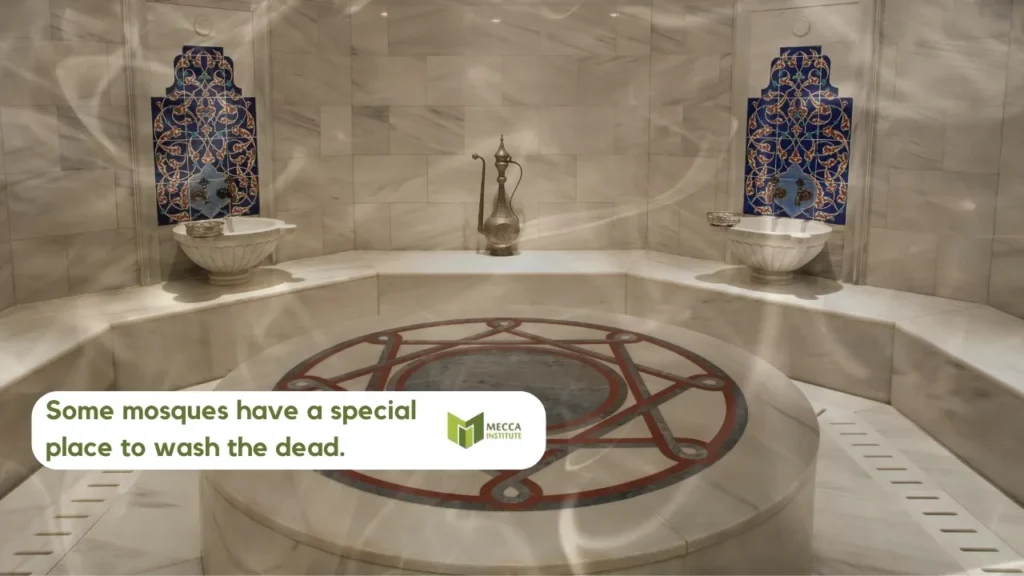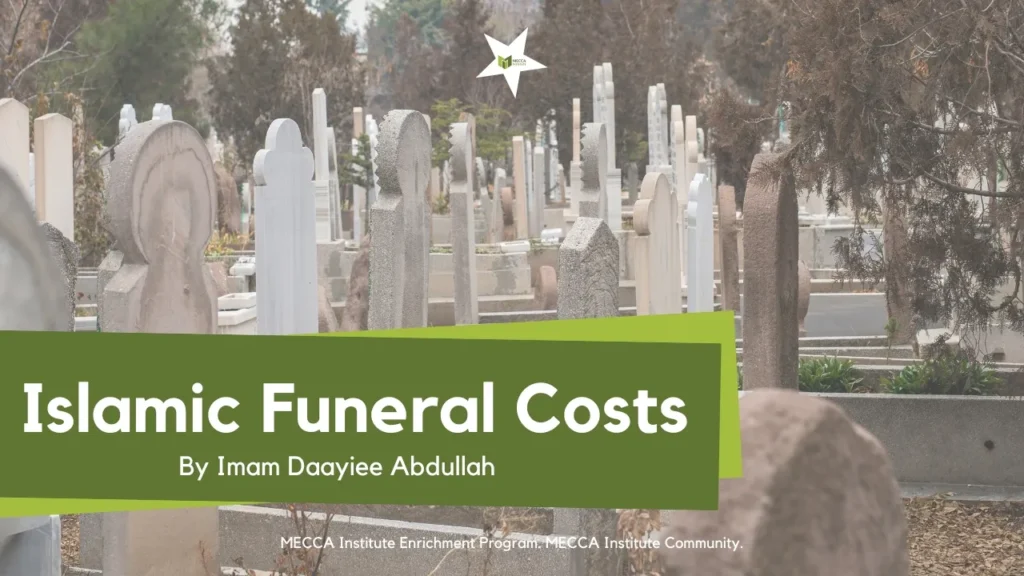Islamic funeral costs are important to consider while living, says Imam Daayiee Abdullah. When a Muslim dies, it can be very expensive, especially in Western countries.
Islamic funeral is a spiritual rite every Muslim goes through. Its costs are nowhere near what it may cost other people of faith, especially if it takes place in a Muslim country.
Unfortunately, there are ten costs that you will need to find solutions for, regardless of whom you are planning for.
In this guide, I intend to help you prepare for this sad but necessary part of being a human being.
Islamic Funeral Costs
Did you know that I became an imam due to the need to perform funeral rites for another Muslim? There was no one to do so in my area, and I had to do it.
Realizing that it was such a moving experience for everyone inspired me to continue with my pursuit of imamship and lead my community.
How much do Islamic funerals cost? They can cost anywhere from just a few hundred dollars to over $50,000. It depends on what you want to have done, including whether or not to transport the body elsewhere.
For an Islamic funeral, regardless of where it is done, the deceased is cleansed. This is called “ghusl” or washing.
Afterward, the body is wrapped in a white cloth called “kafan.” This is usually cotton, and one will require three pieces of it.
At this time, the body is ready for communal services. That starts with a special funeral prayer called “Salat ul Janazah.”
Once the prayer is performed, it is followed by immediate burial without a coffin. This is one of the areas where most Muslims save money.
After the body has been buried, Quranic recitations, supplications, and condolences are offered.
This is where costs can stuck up since different cultures have different requirements, including fancy funerals or even hiring mourners.
Retrieval Costs
This is the beginning of the Islamic funeral costs. I say that because, in some countries, especially in Western countries, the body may not be at home.
Depending on where you are, the cost to receive the body may be anywhere from a few hundred dollars to thousands.
In some cases, the body may be transported to another facility, usually within the hospital or health network. There, an autopsy may be performed.
If an autopsy is required by the local authorities, this is usually because there is a possibility that the person did not die of natural causes. You won’t need to worry about the costs in this case.
Once that is completed, in Western countries, you will need to release the body to a funeral home. This can cost somewhere from $1,000 to $5,000.
In the United States, local state laws dictate who can have custody of the body, how long the body can remain “at large” (not buried), and so on.
Of course, some Muslims require the transportation of the body back to their ancestral homeland. This is the case when someone is in a foreign country as a traveler, working, or a new immigrant.
In this case, the costs can be quite high. For example, from the United States to Egypt will cost anywhere from $10,000 to $20,000.
Cleansing Costs

Once everything is fine and you get the custody of the deceased, then the body is washed and cleansed. This is called “ghusl” in Islam.
The ghusl can be done by family members or trained individuals of the same gender, following specific Islamic rituals.
If you decide to hire a funeral home, they will charge you a fee.
In accordance with Islamic tradition, the body has to be washed before burying it. The particulars are influenced by the denomination, but they all have this requirement.
Washing a deceased Muslim usually involves cleansing the body with water, preferably from a river if available. Some people like lake water, too. The more natural the water, the better.
Once water is secured, then the washing takes place in a manner that maintains modesty. A male body will only be washed by men, and the same with females.
While washing the body, the dignity of the dead is respected by covering all private areas. The process includes three to five washes.
Washing multiple times is a way to ensure a thorough purification. Typically, this is all done while reciting supplications.
In many Muslim cultures, the washing is done by family as that is honorable. However, I also know Muslim families who prefer to have others do it due to being emotional.
Ghusl costs somewhere from $100 to $1,000. Once again, it depends on where you are.
Wrapping Costs
Once the body is clean, it is then that the body is wrapped. The wrapping is in a simple, white cloth, and it is usually three pieces.
This cloth is known as the “kafan” (shroud). It isn’t that expensive itself, but in it depends on the size of the body.
A male body of six feet will require somewhere 80 inches (2 meters) times 3. So, that is about 240 inches or 6 yards (6 meters).
In most countries, the cloth won’t cost too much. In the United States, a 100%-cotton material will go for about $10 per yard. So, in other words, less than $100.
Funeral Prayer Costs
A special prayer is performed for the deceased, usually in congregation, but led by an imam. This prayer is called “salat ul Janazah,” or funeral prayer.
You may ask a qualified member of the family or a friend of the family to perform the Janazah portion of a funeral.
If you do not have someone in your family, you may have to ask your local imam. In close-knit communities, this may be free of charge to you.
In Western countries, however, an imam will typically charge you for their time. A mosque will typically offer “basic” costs.
Burial Costs
The act of burying the body requires several things. Of course, once again, this all depends on where you are.
In Western countries, it requires that you purchase a plot at a cemetery. In the United States, this may cost as much as $10,000. The average is about $3,500.
You will also need to pay for the opening and closing of the grave, which will cost anywhere from $500 to $2,500. There is an additional fee if the interment takes place after hours.
Finally, some cemeteries offer after-burial services for a fee. A service like this can range from $500 to $5,000. This is especially useful when there is an adverse weather. If it’s on a cold day, your party will be happy to be inside and have coffee or tea.
Funeral Reception Costs
In many Muslim communities, there is a mourning reception after a burial. This is called ‘Azza, and it can last for days. Many Muslims choose to have this as a one-day on the same date as the burial.
Of course, there are costs associated with this, too, depending on the culture. Some Muslim cultures have elaborate ‘azzas.
In South Asian cultures like Pakistan, “Rasm-e-Qul” is a big funeral service held three days after burial, where the entire Quran is recited. Animals will be slaughtered, huge amounts of biryanis are prepared, and it can cost a lot.
The family pays for everything. In some rare cases, close relatives or friends may offer assistance by contributing financially.
Conclusion
My overall understanding is that Muslim funerals tend to be simpler and more affordable compared to some other funeral traditions.
First of all, Islam focuses on simplicity and humility in death rituals. This encourages modesty and avoiding extravagance. Unfortunately, different cultures still have their unique ways of mourning, but Islam is really much simpler.
Islamic funeral customs also typically involve burial without embalming, expensive caskets, or elaborate funeral services. All of this can significantly reduce costs.
Of course, in some cultures, there are collective support systems in place to assist with funeral expenses for Muslim families in need.
My advice is to get life insurance so that your loved ones do not have to be bankrupted by your demise. If you are in a country where life insurance is not the way to do things, then perhaps create savings for this important chapter of life.
May Allah continue to guide us all.
Imam Daayiee Abdullah is the Executive Director of MECCA Institute and the author of “Progressive Islam,” a historic book that defines Progressive Islam.

